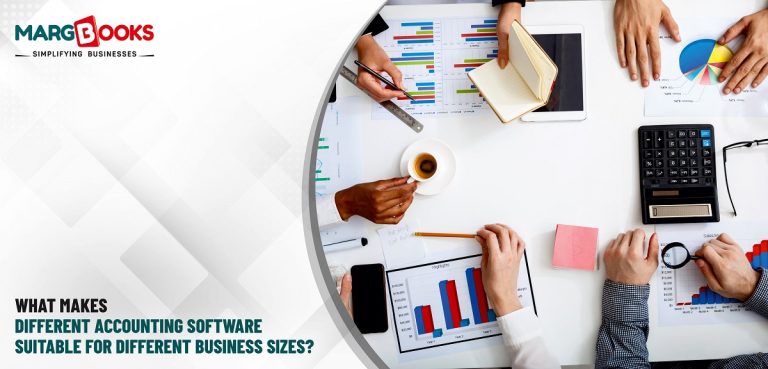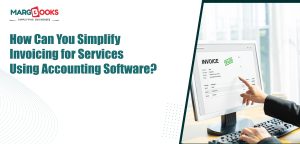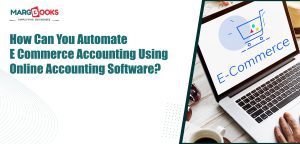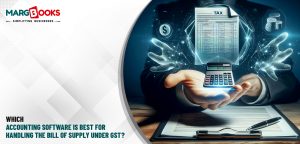Managing business finances efficiently has become more important than ever. Whether you’re running a one-person startup, a growing mid-sized enterprise, or a well-established corporation, having the right accounting solution can make a world of difference. But with so many options available, the big question is, how do you know which accounting software is the right fit for your business?
Let’s dig into what makes different accounting software suitable for different business sizes, and how tools such as GST billing software and online accounting software can simplify day-to-day operations. We’ll also see how reliable platforms, MargBooks, are catering to businesses across the spectrum.
Why One Size Doesn’t Fit All?
Different businesses have different financial management needs. A local Kirana store does not need the same software as a multi-location retail chain or a manufacturing company.
Some key differences between small, medium, and large businesses when it comes to accounting include:
- Transaction Volume: Larger companies process thousands of transactions a day, whereas a freelancer might only have a handful.
- Team Size: Bigger businesses have multiple departments, each needing access to financial data.
- Regulatory Compliance: SMEs might only need basic GST compliance, while larger firms may require advanced tax reporting.
- Budget: Smaller businesses often look for cost-effective solutions, while large enterprises invest in comprehensive ERP systems.
Types of Accounting Software for Different Business Sizes
Here’s a breakdown of the types of accounting software suited for each category of business:
1. Small Businesses & Startups
Startups and small businesses typically look for ease of use and affordability. They need basic features such as:
- Invoicing
- GST billing
- Expense tracking
- Inventory management (basic level)
- Online access
MargBooks, for instance, is a great fit for this category. It offers GST billing software capabilities and is cloud-based, which means you can access your data anytime, anywhere, perfect for businesses on the move. Plus, it’s user-friendly even for those who aren’t from an accounting background.
Ideal Features:
- Online accounting software
- GST-ready invoices
- Bank reconciliation
- Mobile accessibility
2. Medium-Sized Enterprises
As businesses grow, their requirements get more complex. They need software that supports:
- Multi-user access
- Role-based permissions
- Advanced inventory tracking
- Multi-location management
- Project costing
Here, a scalable solution including MargBooks still proves beneficial. It allows integration with POS systems, handles bulk billing, and ensures GST compliance, making it a favourite among wholesalers, distributors, and retailers alike.
Must-Have Features:
- Automated GST return filing
- Integration with CRM and inventory modules
- Real-time reporting and analytics
- Data backups and role-based security
3. Large Enterprises
Larger companies often have multiple branches, thousands of customers and suppliers, and a diverse team. They need a full-fledged ERP solution that supports:
- Complex tax structures
- Customised reporting
- Departmental budgeting
- Multi-currency handling
- API integrations with third-party apps
While some may go for expensive ERP tools, many still prefer MargBooks for its enterprise-level modules available at a much more affordable cost. It brings together powerful accounting features along with supply chain, payroll, and GST billing tools, making it suitable even for big players.
Key Features:
- Automated workflows
- Audit logs and compliance checks
- Branch-wise reporting
- Enterprise-level security
Cloud-Based Software: The Need of the Hour
In recent years, online accounting software has become the preferred choice across business sizes. Why? Because it offers:
- Anytime, anywhere access — crucial for business owners and accountants on the move
- Real-time data updates — helps in quicker decision-making
- Secure backups — reduce the risk of data loss
- Multi-device support — access on mobile, desktop, tablet
MargBooks, being a cloud-based solution, offers all these benefits. It also reduces dependence on local hardware and ensures data is encrypted and backed up regularly.
Importance of GST Billing Software in India
Since the introduction of GST, every business, small or large, must generate GST-compliant invoices, file regular returns, and maintain proper records.
Using dedicated GST billing software, that offered by MargBooks helps ensure:
- Automatic tax calculations
- GSTR-1, GSTR-3B preparation
- HSN/SAC code integration
- Avoidance of manual errors
This makes GST compliance a breeze, especially for businesses that don’t have a full-time accountant on staff.
Final Thoughts
Choosing the right accounting software can either make or break your financial management. From small shop owners to large enterprises, every business has its own set of needs, and thankfully, different accounting software is available to meet these unique requirements.
Whether you’re just starting and need basic GST billing software or you’re scaling up and need advanced online accounting software, solutions like MargBooks are designed to adapt to your business size and grow along with you.
So, take the time to evaluate your business needs, explore the available options, and choose wisely, because the right accounting software is not just a tool. It’s a growth partner.




